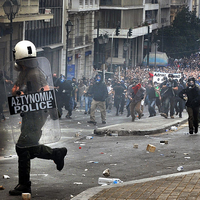On the same day that voters in the United States went to the polls to throw a punch into the gut of the political establishment, some 5,000 miles away, police in Greece had their hands full with a series of bombs mailed to foreign embassies. Greek investigators say the bombs, 11 of them in all, were probably the work of militant activists who, in their own violent way and to a much greater degree, also aimed to overturn the political and economic order. In recent months, angry efforts to take on the system have gained steam throughout the developed world as rich countries have found themselves struggling with a bitter economic crisis. In France, Spain, Belgium, and many other countries, massive protests, with varying amounts of violence, have challenged austerity measures imposed by governments as they struggle to right their listing economies.
The economic crisis has become an important test of the political system in the developed world. The coming months will show just how well the system can withstand the shock of painful economic adjustments. This is one of the most important tests a political system can endure: whether it can survive a crisis without breaking down.
The most dangerous part of the experiment started unfolding late last year, when a newly elected government in Greece revealed that the country's economy was in much worse shape than people knew. The budget deficit, Prime Minister George Papandreou announced, was as high as 13 percent, far more than the official 3 percent benchmark set by the European Union for its members. In the weeks that followed, the Greek economy flirted with default on its massive debt, and the government imposed harsh austerity measures. By this spring, riots in the streets of Athens were boiling out of control.

